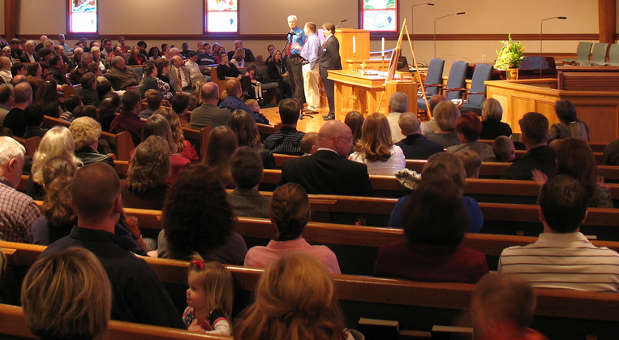This Topic Remains Taboo for Many Pastors
One in four Americans suffers from some kind of mental illness in any given year, according to the National Alliance on Mental Illness. Many look to their church for spiritual guidance in times of distress. But they’re unlikely to find much help on Sunday mornings.
Most Protestant senior pastors (66 percent) seldom speak to their congregation about mental illness.
That includes almost half (49 percent) who rarely (39 percent) or never (10 percent), speak about mental illness. About 1in 6 pastors (16 percent) speak about mental illness once a year. And about quarter of pastors (22 percent) are reluctant to help those who suffer from acute mental illness because it takes too much time.
Those are among the findings of a recent study of faith and mental illness by Nashville-based LifeWay Research. The study, co-sponsored by Focus on the Family, was designed to help churches better assist those affected by mental illness.
Researchers looked at three groups for the study.
They surveyed 1,000 Protestant senior pastors about how their churches approach mental illness. Researchers then surveyed 355 Protestant Americans diagnosed with an acute mental illness—either moderate or severe depression, bipolar disorder or schizophrenia. Among them were 200 church-goers.
A third survey polled 207 Protestant family members of people with acute mental illness.
Researchers also conducted in-depth interviews with 15 experts on spirituality and mental illness.
The study found pastors and churches want to help those who experience mental illness. But those good intentions don’t always lead to action.
“Our research found people who suffer from mental illness often turn to pastors for help,” said Ed Stetzer, executive director of LifeWay Research.
“But pastors need more guidance and preparation for dealing with mental-health crises. They often don’t have a plan to help individuals or families affected by mental illness and miss opportunities to be the church.”
A summary of findings includes a number of what researchers call “key disconnects” including:
- Only about a quarter of churches (27 percent) have a plan to assist families affected by mental illness, according to pastors. And only 21 percent of family members are aware of a plan in their church.
- Few churches (14 percent) have a counselor skilled in mental illness on staff or train leaders how to recognize mental illness (13 percent), according to pastors.
- Two-thirds of pastors (68 percent) say their church maintains a list of local mental-health resources for church members. But few families (28 percent) are aware those resources exist.
- Family members (65 percent) and those with mental illness (59 percent) want their church to talk openly about mental illness, so the topic will not be taboo. But 66 percent of pastors speak to their church once a year or less on the subject.
That silence can leave people feeling ashamed about mental illness, said Jared Pingleton, director of counseling services at Focus on the Family. Those with mental illness can feel left out, as if the church doesn’t care. Or worse, they can feel mental illness is a sign of spiritual failure.
“We can talk about diabetes and Aunt Mable’s lumbago in church; those are seen as medical conditions,” he said. “But mental illness—that’s somehow seen as a lack of faith.”
Most pastors say they know people who have been diagnosed with mental illness. Nearly 6 in 10 (59 percent) have counseled people who were later diagnosed.
And pastors themselves aren’t immune from mental illness. Almost a quarter of pastors (23 percent) say they’ve experienced some kind of mental illness, while 12 percent say they received a diagnosis for a mental-health condition.
But those pastors are often reluctant to share their struggles, said Chuck Hannaford, a clinical psychologist and president of HeartLife Professional Soul-Care in Germantown, Tennessee. He was one of the experts interviewed for the project.
Hannaford counsels pastors in his practice and said many—if they have a mental illness such as depression or anxiety—won’t share that information with the congregation. He doesn’t think pastors should share all the details of their diagnosis. But they could acknowledge they struggle with mental illness, he said.
“You know it’s a shame that we can’t be more open about it,” he told researchers. “But what I’m talking about is just an openness from the pulpit that people struggle with these issues, and it’s not an easy answer.”
Those with mental illness can also be hesitant to share their diagnosis at church. Michael Lyles, an Atlanta-based psychiatrist, says more than half his patients come from an evangelical Christian background.
“The vast majority of them have not told anybody in their church what they were going through, including their pastors, including small-group leaders, everybody,” Lyle said.
Stetzer said what appears to be missing in most church responses is “an open forum for discussion and intervention that could help remove the stigma associated with mental illness.”
“Churches talk openly about cancer, diabetes, heart attacks and other health conditions—they should do the same for mental illness in order to reduce the sense of stigma,” Stetzer said.
Researchers asked those with mental illness about their experience in church.
- A few (10 percent) say they’ve changed churches because of how a particular church responded to their illness. Another 13 percent ether stopped attending church (8 percent) or could not find a church (5 percent). More than a third, 37 percent, answered, “don’t know,” when asked how their church’s reaction to their illness affected them.
- Among regular churchgoers with mental illness, about half (52 percent) say they have stayed at the same church. Fifteen percent changed churches, while 8 percent stopped going to church, and 26 percent said, “Don’t know.”
- Over half, 53 percent, say their church has been supportive. About 13 percent say their church was not supportive. A third (33 percent) answered, “don’t know” when asked if their church was supportive.
LifeWay Research also asked open-ended questions about how mental illness has affected people’s faith. Those without support from the church said they struggled.
“My faith has gone to pot, and I have so little trust in others,” one respondent told researchers.
“I have no help from anyone,” said another respondent.
But others found support when they told their church about their mental illness.
- “Several people at my church (including my pastor) have confided that they too suffer from mental illness,” said one respondent.
- “Reminding me that God will get me through and to take my meds,” said another.
Mental illness, like other chronic conditions, can feel overwhelming at times, said Pingleton. Patients can feel as if their diagnosis defines their life. But that’s not how the Bible sees those with mental illness, he said.
He pointed out that many biblical characters suffered from emotional struggles. And some, were they alive today, would likely be diagnosed with mental illness.
“The Bible is filled with people who struggled with suicide, or were majorly depressed or bipolar, he said. “David was totally bipolar. Elijah probably was as well. They are not remembered for those things. They are remembered for their faith.”
LifeWay Research’s study was featured in a two-day radio broadcast from Focus on the Family on Sept. 18 and 19. The study, along with a guide for pastors on how to assist those with mental illness and other downloadable resources, are posted at ThrivingPastor.com/MentalHealth.
LifeWay Research also looked at how churches view the use of medication to treat mental illness, about mental and spiritual formation, among other topics. Those findings will be released later this fall.






































